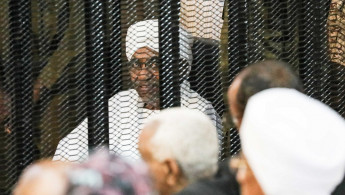Ousted Sudanese president Bashir appears in court for second time on corruption charges
Bashir, wearing a traditional white gown, sat in the same metal cage he appeared in on Monday when his trial on graft charges opened.
In the first hearing, an investigator said that Bashir had admitted to receiving at least $90 million in cash from Saudi royals in recent years.
The judge in Khartoum on Saturday heard three witnesses, two of them investigators who searched Bashir's residence after his ouster and the other a banker.
"We ask the court to release the accused on bail," Bashir's lawyer Hashem Abu Bakr said, to which the judge answered he would examine a written request.
After the hearing, as a massive security convoy escorted the 75-year-old Bashir back to prison, two opposing groups of demonstrators had gathered.
One group of a few dozen protesters were chanting slogans for Bashir to face justice not just over corruption but for his role in the the country's deadly conflicts.
"Bashir is a killer" and "He has to face justice", chanted some of the demonstrators.
Another smaller group had turned out in support of the deposed president, who led a military coup in 1989 and was forced from power by relentless protests in April after 30 years in power.
While the sight of Bashir sitting inside a cage in a courtroom was unthinkable only months ago, many in Sudan and abroad have warned that this trial should not distract from the more serious indictments he faces.
The former Sudanese leader is wanted by the International Criminal Court in The Hague over his role in mass killings in the western region of Darfur.
Follow us on Twitter: @The_NewArab





 Follow the Middle East's top stories in English at The New Arab on Google News
Follow the Middle East's top stories in English at The New Arab on Google News
![The UAE is widely suspected of arming the RSF militia [Getty]](/sites/default/files/styles/image_330x185/public/2024-11/GettyImages-472529908.jpg?h=69f2b9d0&itok=Yauw3YTG)
![Netanyahu furiously denounced the ICC [Getty]](/sites/default/files/styles/image_330x185/public/2024-11/GettyImages-2169352575.jpg?h=199d8c1f&itok=-vRiruf5)
![Both Hamas and the Palestinian Authority welcomed the ICC arrest warrants [Getty]](/sites/default/files/styles/image_330x185/public/2024-11/GettyImages-2178351173.jpg?h=199d8c1f&itok=TV858iVg)